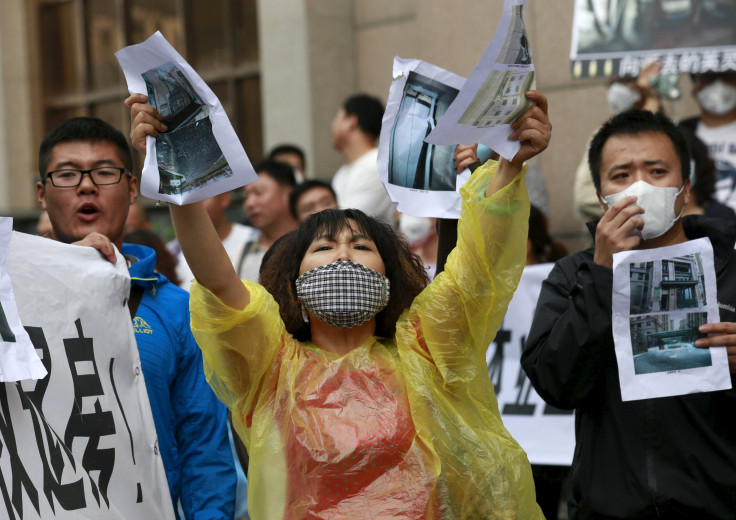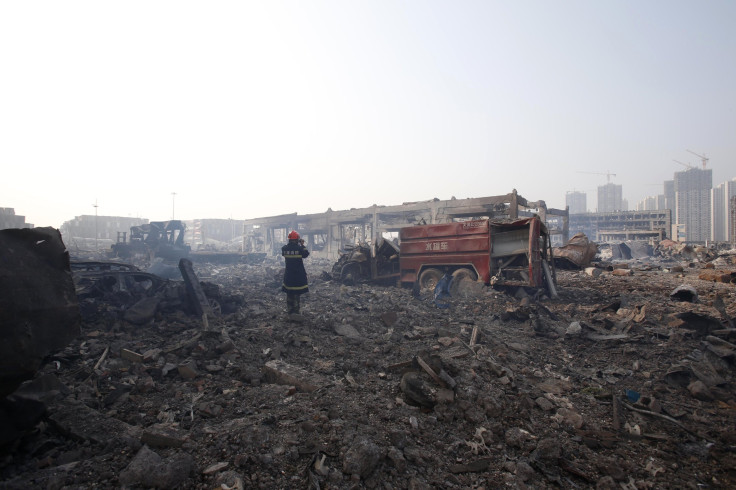Tianjin Blasts: Some Chinese Lose Faith In Government Amid Cover-Up Allegations

When rain first fell onto the streets of Tianjin in the days after explosions in a chemical warehouse killed at least 114 people last week, the streets began to fill with white foam.
At a news conference, Deng Xiaowen, director of Tianjin's environmental monitoring center, said that the foam was "a normal phenomenon when rain falls, and similar things have occurred before." Another official likened the foam to that which appears when you water soil.
The response to this, and other comments from Chinese social media users was ridicule and incredulity. “It defies common sense,” said one commenter, cited by the Wall Street Journal. “Are his flowers watered by soapsuds?”
The foam incident was but one example of the immovable object of Chinese government confidence meeting the irresistible force of public skepticism. Despite the country's Internet censors deleting a huge number of critical social media comments and shutting down a number of websites, other official statements, such as one assuring Tianjin residents that there was no heath dangers from the blasts were greeted with a curt response from commenters: “Bullshit.”
Skepticism of government and even the protests witnessed in Tianjin over the last week are nothing new in China, particularly in the aftermath of national disasters. What does appear to be different with this disaster, however, is a section of the China's middle class, who previously were happy to accept authoritarian rule as long as their economic circumstances continued to improve, losing faith in the government.

“On the surface, your life is no different from a middle-class person in a normal country,” said an online essay, cited by the Journal, which has been viewed over 32,000 times on Chinese social media since it was posted Monday. “But after the blast, homeowners [in Tianjin] are finding that they are the same as those petitioners they looked down on.”
Distrust of the government is rife, both online, and in Tianjin itself, as evidenced by the spread of theories about a government cover-up of the real causes of the blast.
“They are definitely trying to cover it up,” Yuan Ping, 30, whose apartment was damaged in the explosions and is considering of taking the radical step of suing the government, told the New York Times. “I wouldn’t believe even a single word from them,” she said. “The government is doing everything on the surface.”
Chinese citizens have good reason to distrust their government's word on national disasters. In 2011, after a high-speed train crashed near the city of Wenzhou, authorities muzzled press coverage, and used bulldozers to bury some of the train carriages before an investigation into the causes of the crash could be carried out. The leaking of propaganda directives, which sought to limit coverage to stories of heroism and refrain from tarnishing the government's prestigious high-speed rail project, however, caused widespread anger in China.
More significantly, however, was the 2008 earthquake in Sichuan, in which thousands of children were killed, after schools that were allegedly built poorly as a result of official corruption collapsed. Authorities again muzzled press coverage, and offered parents who had lost their children cash payments to keep quiet. A promised government investigation into the matter never materialized.
While Chinese state media have taken the unusual step of being publicly critical of some aspects of the official response, the default position of the government appears largely unchanged. An editorial in the Communist Party mouthpiece the People's Daily this week warned: "Public opinion should also understand the government's cautiousness and earnestness... Questioning and denying are not a rational attitude."
One Chinese activist who the Guardian spoke with, but declined to name for fear of reprisals, has launched her own online database of those missing after the Tianjin blasts. The paper said she fears that the names of the dead may be swept under the carpet.
“It’s not just the migrant workers’ lives that are worthless to [the government],” she said. “They don’t care about the lives of the middle class families either.”
© Copyright IBTimes 2025. All rights reserved.






















